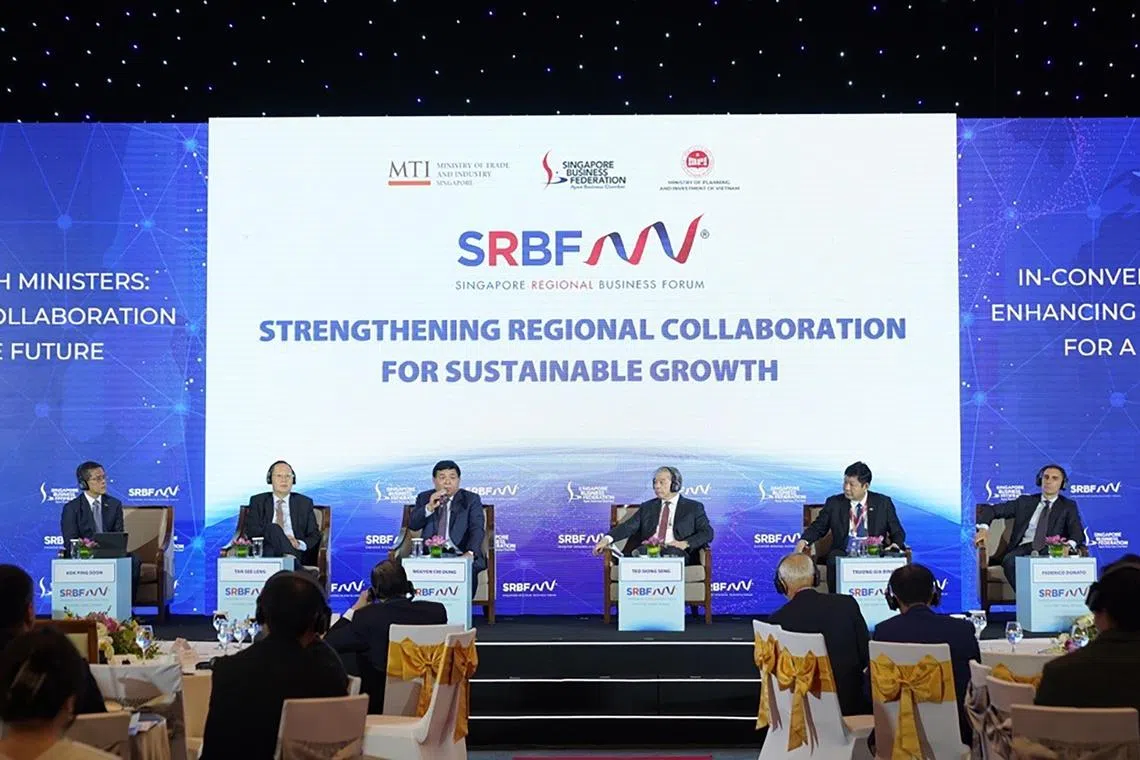Singapore and Vietnam sign 12 MOUs in show of strong ties
Sign up now: Get ST's newsletters delivered to your inbox

Manpower Minister Tan See Leng (second from left) participating in a panel discussion as guest of honour at a business forum in Hanoi on July 7.
PHOTO: SINGAPORE BUSINESS FEDERATION
Follow topic:
HANOI - The ties binding Singapore and Vietnam were further strengthened on Friday, with business, government and educational bodies from both countries signing 12 memorandums of understanding (MOUs) at a business forum in Hanoi.
Trade associations and business chambers, and higher education and financial institutions were among those inking the MOUs during the seventh Singapore Regional Business Forum.
The agreements at the one-day event will boost cooperation between the countries in areas such as sustainability, digitalisation, financial services and human capital development.
For example, students from both countries will get to go abroad regionally for internships with UOB FinLab, after it signed three MOUs.
UOB FinLab is the bank’s innovation accelerator, which was founded in 2015 to help businesses in the region scale across Asean.
It inked the agreements with Vietnam’s Foreign Trade University and National Innovation Centre, as well as Singapore’s Ngee Ann Polytechnic.
Held at the Melia Hanoi hotel in the Vietnamese capital, the 2023 iteration of the forum organised by the Singapore Business Federation (SBF) is the first to be held outside Singapore.
Over 800 business leaders, senior government officials and diplomats from over 420 companies and organisations across 32 economies attended the forum both online and in person.
Minister for Manpower Tan See Leng gave an opening keynote address and participated in a panel discussion as guest of honour.
The other guest of honour was Vietnam’s Deputy Prime Minister Le Minh Khai, who attended on behalf of Prime Minister Pham Minh Chinh.
In his address, Dr Tan, who is also Second Minister for Trade and Industry, said Vietnam’s stellar growth, as well as young and vibrant market, has driven steady growth in trade and investment figures.
As at December 2022, Singapore was Vietnam’s second-largest foreign investor, with a cumulative investment of US$70.8 billion (S$95.7 billion), he noted.
In 2022, bilateral trade between the countries reached $31.3 billion, up more than 16 per cent year on year, according to Ministry of Trade and Industry figures.
Dr Tan also sketched out how bilateral relations and economic cooperation could look like moving forward, highlighting prospects for deeper collaboration in innovation, energy connectivity and sustainability.
He said he had discussed with Mr Nguyen Chi Dung, Vietnam’s Minister of Planning and Investment, to expand the scope of the annual Singapore-Vietnam Connectivity Ministerial Meeting to cover emerging topics in innovation, as well as the green and digital economies.
Dr Tan later told reporters that meetings with Mr Dung and Mr Khai went well, ahead of Prime Minister Lee Hsien Loong’s visit in August, with “exciting developments” to come.
Dr Tan and Mr Dung were among five panellists in a wide-ranging discussion on enhancing regional collaboration for a sustainable future, moderated by SBF chief executive Kok Ping Soon.
The other three were Mr Teo Siong Seng, executive chairman of shipping firm Pacific International Lines; Dr Truong Gia Binh, chairman of information technology services firm FPT Corporation; and Mr Federico Donato, immediate past president of the European Chamber of Commerce Singapore.
Dr Tan said that with the rise of e-commerce, trade partnerships have evolved beyond free trade agreements to include digital partnerships, where data and money – and not just physical goods – flow across borders electronically.
The 12 agreements come after the two governments signed four deals during the Vietnamese Prime Minister’s official visit to Singapore in February.
Singapore and Vietnam mark 50 years of bilateral relations and a decade of strategic partnership in 2023.
Other topics the panellists touched on included managing the environmental impact of needing increased computing power for digitalisation, as well as supporting smaller companies and less developed economies to become more sustainable.
Vietnam’s Techcombank signed two MOUs at the forum: one with SBF to promote investments, and the other with Deloitte Vietnam, PricewaterhouseCoopers Vietnam and Kyriba Singapore to build a digital platform that lets companies analyse their cash flow across multiple banks.
Mr Phung Quang Hung, deputy chief executive at Techcombank, told The Straits Times that although Singapore was Vietnam’s second-largest foreign investor, “there is still a lot of room to grow” for Singaporean foreign investment through the bank.
He said that the bank still attracts more business from Taiwan, China and South Korea, as it has traditionally focused on serving real estate, construction and fast-moving consumer goods – industries where there is a lot of foreign direct investment from these economies. “Our approach is that we do very well in one or two certain economic sectors before we scale out to more economic sectors,” he said.
“We view this forum as an opportunity to expand collaborations, to find better partners and also connect our customers with regional businesses.”

